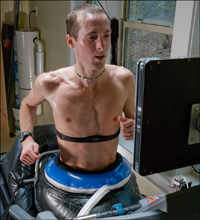 By Joe Battaglia, Universal Sports
By Joe Battaglia, Universal Sports Can you talk about your first time running the New York City Marathon?
I took some bruises that first time in 2006. I learned the hard lessons that a lot of people learn at some point in their marathon careers. I completely ran out of gas, just ran out of fuel. The body only has a certain amount of energy in it, and I basically didn't take in enough. Luckily I haven't had to deal with that again. I never thought I would have so much trouble running 6:30 pace for a mile. That's my easy-run pace. It was a struggle just to make it to the finish line. I think I was probably a little-bit naïve and arrogant to think about what it took to run a good marathon. It doesn't sound hard to run just under five-minute miles but it is a lot harder than I thought it was originally.
Knowing that the marathon is the king of the distances, how did you get sucked into the trap of thinking that running 4:55 pace for 26.2 miles was going to be easier than it seems?
I think it's because the training for the marathon is so moderate. For me, I go and do tempo runs at 4:40 a mile and do that for 13 or 14 miles. You figure, ‘Slowing down that much, it won't be that hard.' That's the thing about the marathon. It's not that hard until about 18, 20 miles. You have to really hold yourself back - at least that's what you feel like - until you hit that point and then it's like, ‘Wow, I guess I wasn't holding myself back.'
In that 2006 race, where did the wheels fall off the wagon and can you describe what you were feeling at that point?
In 2006, I basically hit the wall right after the 35K mark. I was trying to run a smart race but be competitive. The race got really aggressive coming off the bridge into Manhattan and I had to make the decision to go or stay and I kind of went, and that was a problem. The biggest problem was that I sat about 100 meters off of the pack for a good six miles, maintaining decent contact. But it was like someone drained the life out of me. At one point in the race, right after 35K, it felt like someone just pulled the plug. It was a real struggle to get in. In my subsequent marathons, I was a little tentative I think because of that.
Given what you now know about yourself as a runner and about the marathon, how are you approaching this year's race differently?
For this race I would say my training is quite a bit different because before this I never did anything fast and in all of my other marathons after my first one I had a lot of cramping problems in my calves and hamstrings. I think that was part nutritional, sodium imbalances and stuff like that, and we've worked on that quite a bit. The other part is just not having run anything fast. I started my training slower than race pace and got down to race pace, so it was long and slow and I lacked that muscular component of going out hard and fast.
Do you feel your strong background as a cross-country runner will benefit you and if so, which parts of the course suit you best?
The course is definitely not a fast, easy course so I think that benefits me. I haven't really run on a course like that since the Olympic Trials, and I wasn't really in a good place at that time. Just making it to the line was lucky for me. I was injured going into it and not feeling well, kind of anemic, so I ran well there considering the condition I was in. But I think getting back to one of those tough courses will be good for me. It will be a good test to see if I still have that good cross-country background.




 ShareThis
ShareThis